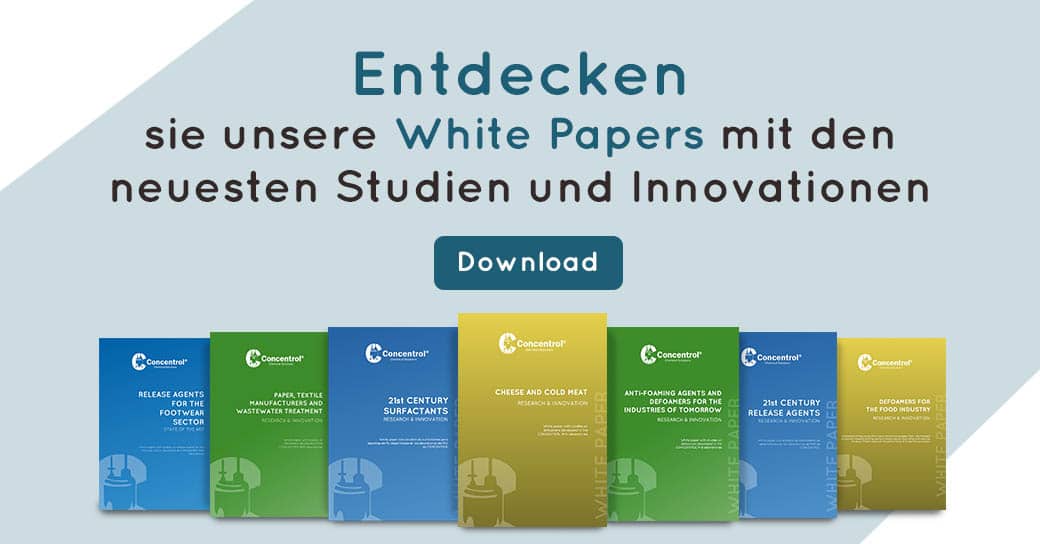At Concentrol we are committed to excellence to offer the best solutions adapted to the needs of our customers. Our team of technicians and professionals work continuously to be pioneers in the sector.
The following article is a collection of studies carried out in Concentrol’s laboratories on adhesives (PSA) and it presents the efficiency of the solutions EMULTROL DFM OLM-40 and EMULTROL DFM OLV-230 compared to other market references.
CONCENTROL’S PRESSURE SENSITIVE ADHESIVES (PSA)
Concentrol, through its Additives Division, works in the development of products for the PSA sector. Self-adhesives (known as Pressure Sensitive Adhesives or the PSA acronym) can bond a variety of materials such as papers, plastics, metals, wood and glass. As their name suggests, they are pressure sensitive, so that they engage on dry surfaces, at room temperature, with simple contact or light pressure. Therefore, they do not require activation by water, solvent or heat.
Within the broad world of self-adhesives, the self-adhesive label market represents an enormously large and growing volume. Concentrol has been working in this sector for years with the development and manufacture of products such as: resin dispersions, antifoaming agents, wax emulsions, silicone and silicone surface additives.
How are they made?
The manufacturing process of a self-adhesive (PSA) consists of four phases: siliconation, adhesivation, conditioning and formation of the complex. Summarising, the support (paper) is passed through a head where the silicone is added, to obtain the siliconised paper. Subsequently, it is introduced into another head where the adhesive is added and finally a sheet is attached to form the self-adhesive itself.
Siliconation
Siliconation consists of applying a layer of silicone to the backing paper that will allow us to apply the adhesive and transfer it to the sheet, protecting the adhesive until its final use and making it easier for the sheet to be detached from the support. In short, siliconation allows us to give the paper a non-stick treatment to prevent the support and the sheet from sticking together.
The silicone layer that is applied to the support can vary, depending on the support itself and the final product, although in general it is usually around 1.1 to 1.3 g / m2. Subsequently, the support (paper), already siliconised, enters a drying tunnel where crosslinking and polymerization are carried out at very high temperatures.
Adhesivation
It is the phase in which the adhesive is applied to the silicone support. Subsequently, drying is carried out to eliminate the water or solvent it contains. The amount of adhesive applied on the support ranges between 10 and 25 g / m2, depending on the final use that it is going to be given.
Conditioning
In the conditioning, a moisture reconditioning operation is carried out on the product by passing it through a steam ramp at low pressure, since the moisture in the siliconation and adhesivation phases can produce undesired effects.
The formation of the complex
This is the last phase of the process and is carried out when the support is joined to the sheet. This process occurs when the adhesive is sufficiently dry and the support has the necessary degree of humidity.
To join the adhesive support with the sheet, it is passed between two contact rollers, leaving both layers adhered. Because the support has a non-stick treatment obtained by silicone, the adhesive only sticks to the sheet.
Concentrol’s range of pressure sensitive adhesives
Wax and silicone emulsions
Silicone emulsions typically contain a silicone component (usually silicone oil), water, and the emulsifiers required to obtain a stable emulsion. From a chemical perspective, a silicone component is a finite chain of silicon and oxygen atoms bonded together. In addition to these bonds, the silicone itself has two other bonds to organic groups.
Microemulsions of silicone polymers are especially recommended for self-adhesive formulations and, after their incorporation into the formulation, they improve the cutting and die-cutting process of paper and film reels, especially at high speeds. Furthermore, due to the wetting of the surface, they improve the rheology of PSA in rolls. In low doses it does not adversely affect adhesion.
They are products that offer good characteristics: thermal and dilution stability, surface wetting, APEO Free, compatibility with anionic and non-ionic soaps / surfactants, easy application, they do not yellow after time, and provide improved slip and abrasion characteristics.
Wax emulsions enable the achievement of removable properties and, in general, to modify cohesion.
Resin dispersions
The main function of Concentrol resin dispersions is to improve the cohesion, tack and adhesion properties of self-adhesive based on polymer dispersions of acrylic resin, PVA, EVA, SBR, NBR, natural latex, polychloroprene and aqueous polyurethane dispersions. They increase adhesion and tack on non-polar substrates and low-energy surfaces, improving their wettability. They can also be used in applications on porous and polar substrates such as paper and cardboard.
Concentrol’s resin dispersions offer a number of advantages: APEO Free, Flexible R&D, flexible manufacturing batches and products suitable for indirect food contact.
Antifoaming Agents
Many of the water-based acrylic adhesives (PSA) tend to foam due to their aqueous composition. Foaming can be an unwanted effect, both in the adhesive formulation process and in its application. Applying a small amount of EMULTROL DFM OLM-40 antifoaming agent by Concentrol allows us to eliminate and prevent the foam in the adhesive, with maximum compatibility, without adverse effects on dispersion performance and a lasting antifoaming effect over time.
Antifoaming agents are effective in doses lower than 50-100 ppm of active silicone, with long-lasting effects, acting both as antifoaming agents and as deaerators. They are designed to be used in direct food contact applications. We have solutions that comply with both the American FDA 175.1051 and European 10/20112 regulations, both for adhesives intended for food contact. Concentrol antifoaming agents are designed APEO-Free, showing high performance, good efficacy and ultimately a good cost / efficacy ratio.
Silicone surface additives
Silicone surface additives are well known products as they offer special properties in paints, inks and coatings. These additives are organo-functional silicones, most of them composed of copolymers of polysiloxane and non-hydrolyzable polyether.
Our range of silicone surface additives allow better wetting without increasing foaming with doses up to ten times lower than traditional wetting agents. They are the right choice for formulators looking to improve slip, wear resistance, levelling, substrate wetting and anti-blocking properties. They can also provide special finishes, increase the smoothness of a coating, decrease friction, improve resistance to abrasion and scratching, etc. They are APEO-Free products and a good cost / effectiveness ratio.
EMULTROL DFM OLM-40 and EMULTROL DFM OLV-230: sustainable and efficient solutions
As mentioned above, at Concentrol we are committed to creating competent, quality solutions that are, at the same time, as sustainable as possible. For this reason, we have designed two antifoaming agents that meet this series of requirements without losing their efficiency.
Our EMULTROL DFM OLM-40 and EMULTROL DFM OLV-230 solutions are more sustainable alternatives, which comply with food contact regulations and match the effectiveness of other antifoaming agents on the market that are made from mineral oils with a high content of volatile organic compounds (VOC).
Those are more polluting and more aggressive on the environment. Regarding volatile compounds, EMULTROL DFM OLM-40 does not contain VOC, while EMULTROL DFM OLV-230 does not contain VOC or SVOC (it should be noted that it is the type of oil used that differentiates whether an antifoaming agent complies with the regulations of food contact or not).
The first one, EMULTROL DFM OLM-40, is based on white mineral oil, with 100% active material and VOC free. Its main use is for the manufacture of pressure sensitive adhesives and it has excellent compatibility with common formulations.
Regarding EMULTROL DFM OLV-230, it is made from modified vegetable oils, a factor that makes it a biodegradable product, free of VOC and SVOC with EU eco-label n. 312/2014. To a large extent, its application is intended for the manufacture of pressure-sensitive adhesives and has excellent compatibility with common formulations.
| EMULTROL DFM OLM-40 | EMULTROL DFM OLV-230 |
| Based on white mineral oil | Based on vegetable oil (biodegradable) |
| 100% active matter | 100% active matter |
| Excellent compatibility with common formulations | Excellent compatibility with common formulations |
| Recommended dose: 0.1 – 0.5% of the total formulation | Recommended dose: 0.1 – 0.5% of the total formulation |
| Contact with food: Title 21 CFR (FDA): 175.105, 176.210. | Contact with food: EU Regulation No 10/2011; Title 21 CFR (FDA): 175.105, 176.210 (paper and cardboard) |
| VOC free VOC | VOC free VOC and SVOC free. EU Ecolabel Regulation n. 312/2014 |
| Main application: Manufacture of pressure sensitive adhesives | Main application: Manufacture of pressure sensitive adhesives |
Table 1: comparison between the characteristics and properties of EMULTROL DMF OLM-40 and EMULTROL DMF OLV-230
EMULTROL DFM OLV-230, being composed of modified vegetable oil, has an important advantage for its use: it is more sustainable than antifoaming agents based on mineral oil. Although petroleum-based antifoaming agents are generally less expensive solutions, in many cases they are virtually toxic products containing high amounts of VOCs and SVOCs.
Precisely, the European Commission initiated evaluation processes around the risks posed by petroleum-derived antifoaming agents, stating the need to declare the presence of mineral oils in a multitude of food products.
For this reason, betting on products such as EMULTROL DFM OLV-230, biodegradable and free of pollutants, is an increasingly important requirement. At the same time, these solutions have the same efficiency as traditional products, preserving their high capacity to eliminate foam and prevent defects and irregularities in the final product.
At Concentrol we work to develop the best solutions for our clients. With the aim of offering the best possible product with the best value for money on the market, taking into account the fundamental matter of sustainability, we develop solutions in our laboratories and we are committed to R&D day after day.


